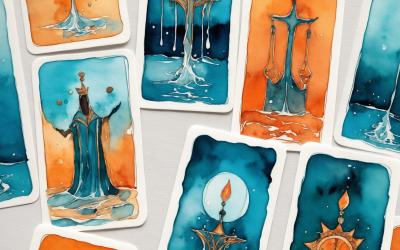Ever wondered how to navigate tarot with grace and respect? Explore essential etiquette, from creating sacred spaces and setting boundaries to ethical reading practices, enhancing your tarot experience.
Have you ever wondered how to navigate the intricate world of tarot with grace, respect, and genuine insight? Whether you're a seasoned reader or a curious newcomer, understanding the nuances of tarot etiquette can transform your practice from merely interesting to profoundly impactful.
The Art of Creating Sacred Space
Creating a comfortable environment for a tarot reading isn't just about dim lighting and scented candles (though who doesn't love a good ambiance?). It's about crafting a space where insights can bloom and self-reflection can flourish.
Imagine your reading space as a cozy nook in the vast universe of possibilities. It's a place where judgment takes a backseat, and open-mindedness rides shotgun. Whether you're reading for yourself or others, this space should feel like a warm hug for the soul.
The Art of Boundaries
In the world of tarot, boundaries aren't barriers that separate us; they're the foundation that allows us to connect more deeply.
When reading for others, remember: you're not a fortune-teller with a crystal ball (unless you are, in which case, kudos on the multitasking). You're a guide, a mirror, a friendly face in the fog of uncertainty. Set clear expectations. Let your querents know that you're here to explore possibilities, not to predict their future lunch order.
And for all you lovely tarot enthusiasts reading for yourselves, boundaries apply to you too! Set aside time for your practice, treat it with respect, and remember: the cards are a tool for reflection, not a Magic 8 Ball for life's every decision.
The Art of Listening
Listening in tarot isn't just about hearing words; it's about tuning into the frequency of the moment. When those cards hit the table, they're not just pretty pictures – they're gateways to understanding.
But here's the kicker: the real magic happens when you listen not just to the cards, but to yourself and your querent. What feelings bubble up? What memories surface? These are the true treasures of tarot.
And let's be honest, sometimes the cards will say things that make you go "Huh?" That's okay! Embrace the confusion. Laugh at the absurdity. Tarot, like life, doesn't always make sense at first glance.
The Art of Ethical Practice
Walking the ethical line in tarot is like trying to do yoga on a tightrope – it requires balance, focus, and occasionally, a willingness to look a bit silly.
Honesty is your best friend here. If a card confuses you, say so. If you're not sure about an interpretation, admit it. Your querents will appreciate your authenticity more than any forced wisdom.
It's crucial to understand and communicate the boundaries of your role as a tarot reader. You're not a substitute for licensed professionals. If a querent needs medical advice, they should consult a healthcare provider. For legal issues, they need a lawyer. If they're struggling with mental health, a qualified therapist or counselor is the appropriate resource. Your role is to offer insight and perspective through tarot, not to diagnose, treat, or advise on specialized matters outside your expertise. Be clear about these limitations with your clients, and don't hesitate to refer them to relevant professionals when necessary.
The Art of Consent and Empowering Questions
Here's a thorny issue in the tarot world: "Does he like me?" or "What is she thinking about me?" These questions about others are common, but they open up a can of ethical worms.
Remember, consent is key. Reading about someone who isn't present and hasn't given permission is a no-go. It's not just about ethics – it's about empowering your querent.
Instead of focusing on others, guide your clients towards questions that inspire confidence and personal growth. "What can I do to improve my relationships?" or "How can I communicate my feelings more effectively?" These questions put the power back in the querent's hands.
Your role is to help clients become the heroes of their own stories, not co-dependent on the cards or other people. Encourage questions that promote self-reflection, personal responsibility, and positive action. This approach not only respects others' privacy but also fosters genuine personal growth.
The Art of Digital Divination
In this age of zeros and ones, tarot has found its way into the digital realm. But just because you're reading through a screen doesn't mean etiquette goes out the window.
Respect digital boundaries as you would physical ones. Ensure your virtual reading space is secure and comfortable. And please, resist the urge to multitask during online readings. Your Instagram feed can wait – the cards demand your full attention!
The Art of Self-Care
Last but not least, let's talk about you, magnificent purveyor of cardboard wisdom!
Reading tarot, whether for yourself or others, can be emotionally taxing. It's okay to take breaks. It's okay to say no to readings when you're not in the right headspace. Treat yourself with the same compassion you offer your querents.
And never stop learning! Tarot is a journey, not a destination. Embrace new perspectives, explore different decks, and always approach your practice with a sense of wonder and excitement.
Dos and Don'ts
Do
- Do set clear boundaries and expectations before each reading
- Do create a comfortable, judgment-free space for your readings
- Do listen actively to your querent and the subtle messages of the cards
- Do encourage questions that promote self-reflection and personal growth
- Do respect the privacy and consent of individuals not present in the reading
- Do practice self-care and know your limits as a reader
- Do continue learning and expanding your tarot knowledge
- Do be honest about your interpretations, even when they're unclear
- Do refer clients to professional help when questions go beyond tarot's scope
- Do maintain confidentiality about your clients' readings
Don't
- Don't claim to predict the future with absolute certainty
- Don't read for someone without their explicit consent
- Don't offer medical, legal, or mental health advice unless you're licensed to do so
- Don't become emotionally invested in your clients' decisions or outcomes
- Don't use tarot as a substitute for professional therapy or counseling
- Don't break confidentiality or share details about your clients' readings
- Don't rush through readings or multitask during sessions
- Don't impose your personal beliefs or biases on your querents
- Don't encourage dependency on tarot for every life decision
- Don't forget to take care of your own emotional and mental well-being
Remember, these guidelines are here to enhance your practice and ensure a respectful, ethical approach to tarot reading. They're not rigid rules, but rather guideposts to help you navigate the sometimes murky waters of divination and personal growth work.
In Conclusion: The Heart of Tarot Etiquette
At its core, tarot etiquette is about respect – respect for the practice, for your querents, and for yourself. It's about creating a space where insights can flourish and personal growth can thrive.
So shuffle those cards with intention, lay them out with care, and interpret them with an open heart and mind. And remember, in the grand tapestry of life, tarot is but one thread – albeit a particularly sparkly and insightful one.
Now, shall we turn over that first card?






